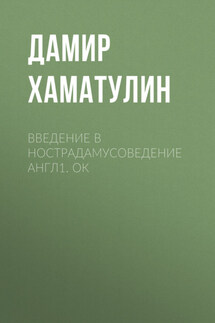Introduction to knowledge about Nostradamus - страница 15
2-13 Le corps sans ame plus n'estre en sacrifice,
Iour de la mort mys en natiuite'.
L'esprit diuin fera l'ame felice,
Voyant le verbe en son eternite'.
A body without a soul is no longer a sacrifice
The day of death is the day of birth:
The divine spirit will make the soul happy,
Seeing the verb in its infinity.
The “verb”, that is, the word, is the body that Nostradamus is talking about, promising that not a single word will remain without a “soul”. The soul, or the hidden and secret numerical meaning inherent in any word of the "Prophecies", as I understand it, is fixed by this Edict of Nostradamus forever, that is, until the end of all the ends of the existence of the Centurian world. And this must be accepted, all “verbs” that have “souls” are ranked, that is, each word has its own “passport”.
___________________________________________________________________________
Near the current location, quatrain 2-16 suggests celebrating, according to ancient Greek custom, a holiday – “Hecatomb”.
2-16 Naples, Palerme, Secille, Syracuses,
Nouueaux tyrans, fulgures feuz celestes:
Force de Londres, Gand, Brucelles, & Suses,
Grand hecatombe, triumphe faire festes.
Naples, Palermo, Sicily, Syracuse,
New tyrants, the fires of heaven sparkle:
Strength from London, Ghent, Brussels and Susa,
Great hecatomb, triumph to arrange holidays.
"Hecatomb" – other Greek. – "one hundred bulls" – a solemn sacrifice of a hundred bulls. And the numeral "one hundred", in this case, of course, is key. If one of you were the Author of the "Prophecies", then, probably, it would not be such a difficult task to write out all the nouns from this quatrain on a separate sheet of paper and make sure that at the end of the book (seven Centuries) their total number equaled one hundred. Which, apparently, did Nostradamus. The only unwritten, but proven rule is not to include the word quatrain in the calculation – tasks. Below all statistics :
"Naples"=5 (1-11, 3-25, 3-74, 5-43, 7-6);
"Palerme"=1 (7-6);
"Secille, Sicille" = 6 (1-11, 2-4, 2-71, 3-25, 5-43, 7-6);
"Syracuses"=0;
"Tyran(s)"=7 (1-75, 1-94, 2-36, 2-42, 4-55, 6-76, 7-21);
Feu(z,s,x)=56;
"Force(s)"=10 (1-15, 1-33, 1-94, 3-71, 3-100, 4-50, 4-70, 4-73, 6-62, 7-33);
"Londres"=6(1-26, 2-51, 2-68, 4-46, 4-89, 6-22);
"Gand"=3 (2-50, 4-19, 5-94);
"Brucelles"=3 (2-50, 4-81, 6-47);
"Suses"=0, or =1(Suze- 6-6);
" Hecatombe " = 1 (5-18);
" Triumph "=0;
" Feste ( s )" = 2 (1-50, 1-58).
As a result, provided that " Suses " and " Suze " are different words, the sum of the words is 100. The hecatomb took place.
___________________________________________________________________________
Let me skip for a while to the fifth Centuria, since its eighteenth quatrain contains the second hecatomb.
5-18 De dueil mourra l'infelix proflige',
Celebrera son vitrix l'heccatombe:
Pristine loy, franc edit redige',
Le mur & Prince au septiesme iour tombe.
The unfortunate vanquished will die of grief,
The winner of the hecatomb will celebrate it:
According to the old Frankish law, an edict was drawn up,
The Wall and the Prince fell on the seventh day
Here the situation is somewhat different, but the essence is the same. All the nouns of the quatrain are again sacrificed. According to the result of seven Centuries, the picture is as follows:
" Dueil "=2; " hecatombe "=1; " loy ( loi , lois , loix )"=30; " edit ( edict )"=5; " mur ( murs )"=13; " prince ( princes )" = 32; " iour ( iours )"=20.






